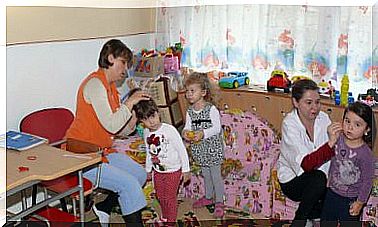4 Basic Stress Rules For Kids

Accentuation rules often pose big problems for children. The theory is very simple, but the practice is not so simple. So our basic stress rules focus on how children are to use them.
What is a syllable?
Definition and types
Many times this point is understood, but it is key to accentuate the words correctly. Roughly speaking , a syllable is each of the strokes of the voice into which a word is divided.
Once we divide the word, we have two types of syllables: stressed and unstressed. The stressed syllables are the loudest sounding syllables and there can only be one per word. In addition, these are the ones that will be accentuated, or not, depending on your position. On the other hand, we have the unstressed syllables, which are the ones that are pronounced with less force.
How to identify the stressed syllable?
A very useful exercise to identify syllables is saying the word out loud. Moreover, if the word has several syllables, it is very good that they change the accent, because they will immediately identify which is the correct position.
For example, dog has two syllables – pe- and -rro -. If you change the position of the stressed syllable to the last syllable, it will be very strange for you. Therefore, they check that the stressed syllable is the first.

4 basic stress rules
Introduction to Basic Accentuation Rules for Kids
Before starting with the rules, you have to know how to interpret them correctly. The Pan-Hispanic Dictionary of Doubts differentiates the position of the stressed syllable as last, penultimate, antepenultimate and the one before it. However, it will not take long for children to forget it.
Therefore, we are going to use a different strategy to say the same in a simpler way. Instead, we will talk about the first, second, third or fourth stressed syllable from the end.
The downside is that not all stressed syllables are stressed. For this reason, children have to learn the basic rules of accentuation. Also, if you have some simple examples for reference, you will remember the rule better.
Sharp
They are those in which the first syllable at the end is tonic and they are accentuated when they end in a vowel, n or s . For this reason we write with the accent hare , coal or centipede but not drum or animal .
However, you have to be careful with monosyllable words. Although they are always acute, there are cases in which they can be written both with and without an accent. For example, we have yes to affirm, and yes to express a condition. In these situations the tilde changes the meaning.
Plain
In these words the stressed syllable is the second from the end and is only accentuated when the word ends in a consonant other than n or s . That is, the rule contrary to that of sharp words and in the second syllable. Therefore, if children learn the first rule, they will also know the second.
We can find many examples both with and without accent, especially in verb forms. Some accented plain words are pencil , soccer or sugar , and among those without accents we find hammer , chair or pear .
Esdrújulas
Esdrújulas are a children’s paradise, because they don’t have to remember vowels, consonants or exceptions. That they sharpen the pencil because, if the third syllable starting from the end is a tonic, it will always have an accent. Among the words esdrújulas we find pen , compass or music .

Overdrives
Do you remember the rule of the esdrújulas? Well, it is exactly the same. Overtical words have the fourth stressed syllable and are always stressed.
This type of word is not very frequent. In fact, they only occur in some complex verb forms. Some examples are drink it , send it to me, or give it to them .
Reading and basic stress rules
Learning these stress rules in single words will only help in the short term. The children may pass the test, but will they remember the following month? Maybe not.
Reviewing is an essential part of learning, and reading is a very beneficial spelling resource. If a child has reading habits, they will probably remember how a word is stressed without having to use the spelling rule.










